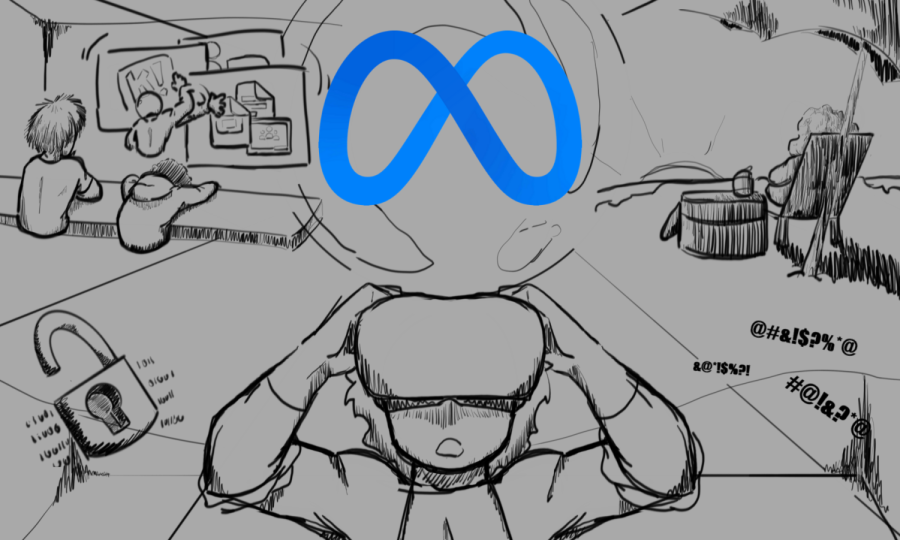Enter The Metaverse, But Beware The Dangers
April 28, 2022
You may have heard of Facebook’s recent name change to Meta, and wondered: why are they bothering with changing their name? Facebook is rebranding itself as a big player in the future concept of “The Metaverse”. But what does that mean?
Imagine an internet in 3D space, similar to virtual reality, but offering much more than just niche games and experiences. In this world, you would be able to learn, go to school, make friends, work, and live life like you would in the real world, but without ever leaving the comfort of your home. You might wear a haptic suit, receive data from neural inputs and attend school in an augmented reality in the metaverse conceived by Mark Zuckerberg and his contemporaries. You will be able to make things happen just by thinking about them, as there are devices in development that process brain waves and synapses as input. This might remind you of The Matrix, where humans exist in a simulated reality that feels real, but is simply a pale reflection of the actual world. If you’re like me, you are probably wondering why we might want to go down this road as a society.
Teleportation will also be possible (at least “within the metaverse”). In today’s world, when you want to go to a website, you type in the URL (say, youtube.com) and your browser takes you there in just a few seconds. This functionality will be present in the metaverse as well, except it will also work for places. In the metaverse, simply pick a location and be teleported there instantly! Want to go to Fiji? No prob! You can be whisked away to a simulated white sand beach in the blink of an eye! No more hassle commuting to JFK and sitting in a sardine can of an airplane for hours upon end! It won’t be all seamless, though. Your physical person will still have to eat, go to the bathroom, shop for food (although online ordering is possible, so no need to leave your apartment), and perform other, shall we say necessary, activities that your body demands.
You may be asking yourself: “What benefits would this metaverse offer me? Why would anyone sign up for this?”. There are a lot of benefits, the most prominent being convenience. You can travel anywhere within seconds, access educational resources and academic materials in a flash (no more rifling through the library stacks), and talk to your friends without having to leave the house. Having to schedule flights for travel will be a thing of the past.
The metaverse will also be a boon for productivity. With the technologies we will have access to in the metaverse, people will be able to work in a preferred environment with conditions that could optimize productivity. If I preferred to work in a quiet jungle, I could do that; if you want to work in your own home, you can do that! If some person making questionable life choices wants to work in the office like usual, they can do that too! There will be freedom of choice in how and where you work in the age of the metaverse.
In the metaverse, even how we learn will be transformed. There are experimental technologies which someday will allow you to learn about something simply by looking at it (think Neo’s jung fu training program in The Matrix–the course is just uploaded to his brain)., This would be a major advancement in terms of stretching our abilities to learn. If you see something–say, a Monarch butterfly floating by in the park–and you want to learn about, simply look at it! The Metaverse will provide you with a wealth of information about that thing. Spy an intriguing but unfamiliar flower on the ground? Look at it and learn more about it. Artificial intelligence (AI) operating on behalf of the Facebooks of the world will be able to make sense of objects and places, even those not in their databases, and direct you to accurate sources of information about what you’re looking at anyway. The job market will expand with the coming of the metaverse, as it will open up new jobs that even now aren’t possible yet. These are just some of the benefits that the metaverse will bring.
The metaverse isn’t all sunshine and rainbows, though. There are some problems I have with it, the most prominent being privacy. Meta will control the servers and back-end of what users engage with to access the metaverse. Despite reassurances that Meta and Facebook will not record you or use your data, they will be able to listen in on internet traffic and to what users are doing on the platform. With new technologies that will inevitably exist down the road, devices will be capable of processing and storing our thoughts and feelings. Facebook has historically fumbled the handling of consumer data, such as during the Cambridge Analytica scandal. It’s possible for our data to fall into the wrong hands.
Also, by joining the Metaverse, you effectively surrender your privacy. As a user of the metaverse, you will consent for Facebook to collect, process, view, and distribute your private thoughts. People wouldn’t give their family or even their BFFs this kind of high-level access! And we’re going to give it all away to a company that’s not fully transparent with how they use our data and have historically been terrible at handling it? I don’t know about you, but I would personally think twice (or heck, even three times) about giving them that permission.
There’s also the problem of polarization. In the metaverse, you will be able to tune your world to what you want it to be. Want a world where Republicans don’t exist? You can have that. Want a world where only one computer brand exists? You can have that too. With all these options to personalize your experience in the metaverse, there is a serious risk of isolation, where you can escape a world where people won’t agree with you.
Moderation will also be an issue with the metaverse. It’s already very tough to moderate a huge social media platform like Instagram because of how many posts there are and how often people post. Automatic filters can help, but they aren’t enough. Real people have to go in and moderate the content themselves, and even then, it’s hard just because of the volume of the content. In a platform as open as the metaverse, moderation will need to be more invasive. Every action will need to be monitored, and that is worrying to me. What if there was a political party that Meta didn’t agree with, even though they were doing nothing wrong, or a person was going about their daily lives, but Meta did not approve of one of their tattoos? Things people do can be taken in many different ways, and monitoring everything people do is invasive and violates individual freedoms and privacy.
Finally, there is the problem of harassment. Trolls are already the scourge of the current internet and they will be even more emboldened in the metaverse. Harassment and bullying will feel more real and hurt more as these threats will have the feel of real human interactions. In a world where everyone will be living their lives in the metaverse, just trying to succeed, people who don’t like them could come out of the shadows. This makes bullying an attack vector on people that we need to worry about if the metaverse is going to take off.
Overall, the metaverse has some amazing benefits with a deluge of downsides. I am absolutely blown away by the technology that will be used in making the metaverse possible, especially since these advances will have implications for other industries, such as commerce. The metaverse represents the next iteration of social media, with all of the benefits and downsides cranked up to 11. I think that even if the metaverse is more of an optional diversion rather than a space we are all obligated to opt into, I still wouldn’t be okay with it, because of how easily we are allured by the sheen of marketing and all of the private information data-sucking corporations like Meta would have access to. But the nature of social media, with its psychologically damaging effects, makes me believe that the metaverse turns those of us who might opt out into outcasts. With how fast new technologies and platforms spread, I think that the metaverse will very quickly become a very unfortunate necessity.















